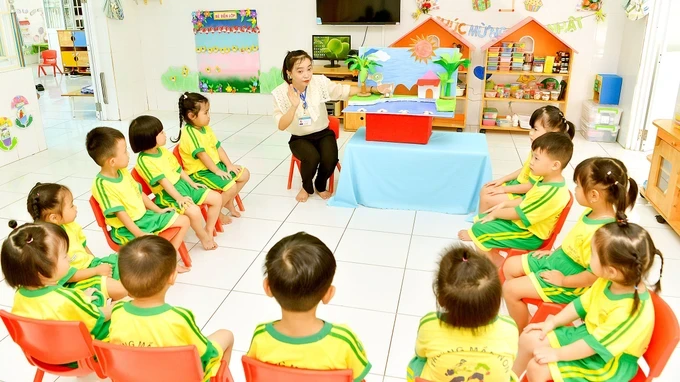
The Ministry of Education and Training has finalized the draft National Assembly Resolution on universalizing preschool education for children aged 3-5. This crucial step aims to uphold children's rights and interests while gradually enhancing the quality of early childhood education in Vietnam.
Recent years have witnessed significant advancements in preschool education. Initially characterized by challenges related to facilities and staffing, the landscape has evolved with an expanded network of schools and classes. Public preschool education has been tailored to meet local needs, while non-public preschool education has diversified its offerings in terms of school types and class structures.
Approximately 4.6 million children between the ages of 3 and 5 enrolled in 15,256 preschools and 17,444 public educational institutions. Private preschools represent 20.8 percent of the total.
Preschool education is presently encountering numerous difficulties and challenges. These include a network of schools and classes that fails to align with actual needs, a low enrollment rate of children, a high prevalence of temporary classrooms and reliance on external learning sources, and a significant shortage of preschool teachers in various regions.
Additionally, the support policies for preschool educators are inadequate.
Currently, the Law on Education only stipulates universal education for 5-year-old preschool children, but there are no regulations on universal education for 3-5-year-old preschool children. While the amendment of the Law on Education needs a roadmap, it is necessary to issue the National Assembly's Resolution on universalizing preschool education for 3-5-year-old preschool children, creating a legal corridor to implement the policy of universalizing preschool education for preschool children. Education experts all support this policy, because investing in preschool education is caring for the future of the country.
To effectively universalize preschool education for children aged 3 to 5, it is essential to adopt coordinated solutions. First of all, there need to be policies on training, fostering, and recruiting preschool teachers, especially in areas with industrial parks and export processing zones; plus, policies regarding financial assistance for educators should be established to ensure that preschool teachers can perform their duties with confidence.
Therefore, policies for preschool teachers should be considered first when universalizing preschool education for children aged 3-5. In addition, there should be specific and detailed regulations on socialization as well as investment in facilities for preschool education. In particular, there should be preferential policies and tuition exemption for children who are beneficiaries.
While budget concerns must always be considered, it is important to recognize that tuition exemptions can expand access to education and alleviate societal burdens. Naturally, careful calculations will be required to make sure it to be carried out smoothly.
























